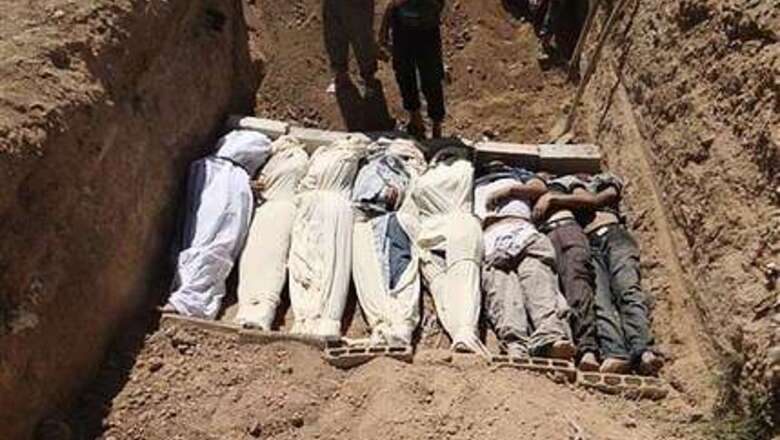
views
It would be easy to forget that Syria was among the first countries to flare up in the Arab Spring. In March 2011, street protests over the detention of schoolboys in Darraa grew so quickly, that most predicted Assad would go quicker than Gaddafi or Yemeni President Ali Abdullah Saleh would. Gaddafi had oil reserves and a control of his country far beyond anything Assad could claim, and Saleh was an important ally. Yet the consequences of international intervention in Syria, especially given its geographical location were clearly much higher, and Western countries decided that it made more sense to focus on Libya. Two years later, Gaddafi, Saleh, Mubarak and other Arab leaders are all gone, yet Bash'ar Al Assad remains in control of most of Syria, winning back much of the territory claimed by rebels in the past 2 years. And despite the costs of all that followed the intervention in Libya, including the chaos that claimed the life of the US Ambassador in Benghazi, Western countries are making the case for an intervention in Syria.
Reports now point to a considerable military buildup in the region: the UK has moved more warplanes and military transporters to the Akrotiri base in Cyprus, the US has moved a fourth destroyer ship with long-range, subsonic cruise missiles into the Mediterranean sea, and France has announced it stands by to assist any strike along with its aircraft carrier and submarines stationed there. Over the next few days, the UK parliament is likely to sign off on military action against Syria, while President Obama and Secretary of State Kerry have met the National Security Council to discuss options. The immediate provocation is Syria's alleged use of chemical weapons on hundreds of civilians, that is being investigated by UN inspectors, but there are many other crisis points in the Syrian spring that interventionists are pointing to. More than 100,000 Syrians have already died in the conflict, more than a million refugees have fled the country. Syria is on the brink of a full scale war, and Assad's forces have been weakened on the ground, even as he has lost his top commanders, and his own National Security Advisor to rebel attacks.
Despite all that, the Western Bloc is in a position where no matter what it chooses to do: surgical strikes, widespread attacks on Assad forces, increased support to the rebel opposition or full-scale intervention for regime change, there is no desired outcome.
It is already clear that an intervention will lack a United Nations mandate, given that Russia and China intend to veto any action against the Syrian regime, something they had done with Libya in March 2011. Perhaps that is why the NATO countries have begun their military buildup without waiting for the UN inspectors' report that is due next week.
NATO action will also lack the sort of regional support they touted for the Libya action. While countries like Israel are worried about being the target of possible Iranian retaliatory strikes, Lebanon is already feeling the backlash, with bomb blasts in Beirut and Tripoli hinting at more violence if strikes are carried out. Military allies like Jordan and Cyprus are counseling a political solution, and refusing to allow their bases to be used to launch the strikes, which will now most likely be sent off from sea. At this time US President Obama must miss the presence of his former Secretaries Robert Gates and Hillary Clinton, who were able to win favour for the Libya operation simply because they didn't seem trigger happy, or desirous of the intervention that followed. His current lieutenants NSA Susan Rice and UN Ambassador Samantha Power, are instead known for their pro-interventionist beliefs, and as a result, make any other possible US allies, wary. Even inside the UK, the Labour party has announced its opposition to an intervention in Libya, forcing the government to get a double-vote before it clears action.
The biggest reason for the US to stay out of Syria at this point, however remains the 'Al-Qaeda' argument. Any attack to weaken Assad is going to directly benefit Jihadist rebel groups led by the Jubhat Al Nasra who now dominate the opposition to Assad. While the US has maintained a "go-slow" on arms to the Free Syrian Army, given worries it would end up in the hands of Al-Qaeda cadres, they will emerge much stronger if the US is able to disable the Syrian bases or enforce a no-fly zone. The spectre has led former US Congressmen Dennis Kucinich to ask "So what, we're about to become Al-Qaeda's air force now?" Even if the West is able to oust Assad with minimum intervention (or what was called 'intervention lite'" in the Libyan bombings), they will certainly need a full scale Iraq and Afghanistan type intervention in case Al-Qaeda is able to rule a post-Assad Syria.
The military options that US and allies are "considering" unilaterally, are therefore based on flawed premise. "Surgical strikes" may do nothing to help the victims of the chemical attacks, and may have little impact on Assad's installations, given that the element of surprise has already been lost, and anything more than surgical strikes are only likely to worsen the situation. If stopping human rights violations is indeed the motive for these countries, then their only option remains to accept the United Nations' authority exceeds theirs, and await an international mandate to tackle Assad's Syria.



















Comments
0 comment